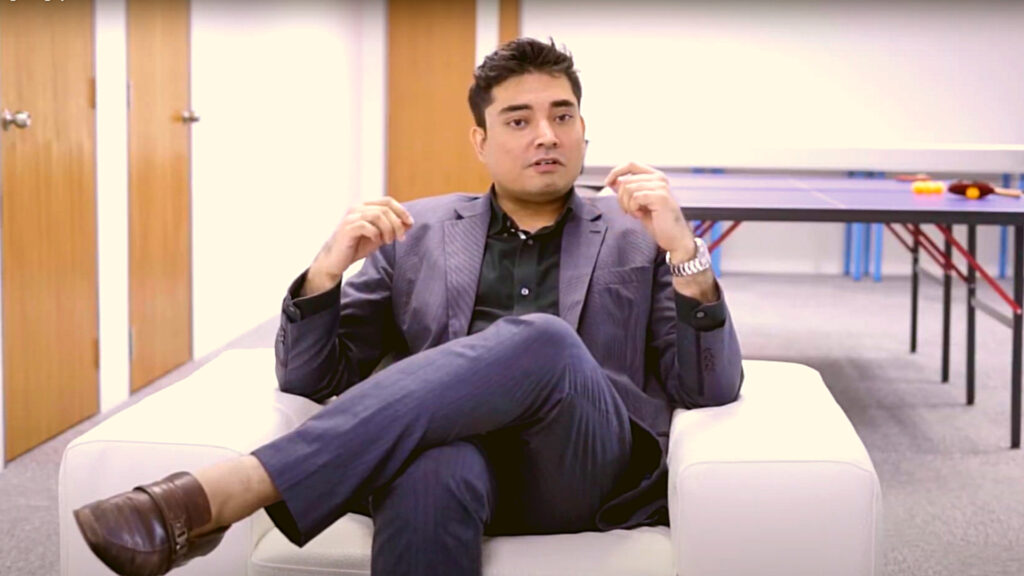Sancy Suraj, also known as the “Pi-gorilla of memorization,” recently set a new record in Singapore for reciting 1500 digits of Pi in under an hour. As a memory athlete, Suraj has been able to develop incredible memory skills using various techniques and strategies. In this article, we’ll learn more about Suraj’s training process, his notable achievements, and his advice for individuals interested in improving their memory skills.

Can you tell us more about your training process leading up to the event, and how you prepared for such a challenging feat?
To prepare for the event, I followed a rigorous training schedule that involved a lot of practice and repetition. I started by memorizing smaller sets of numbers and gradually worked my way up to larger sets. I also used visualization techniques to help me remember the numbers more effectively. For example, I would associate each number with a particular image or object, and then create a story in my mind using those images.
In addition to visualizing the numbers, I also used other memory techniques such as the memory palace method. This involves creating a mental image of a familiar place, such as your home, and then associating each item you want to remember with a specific location within that place. This helps to create a strong visual link between the item and its location, making it easier to remember later on.
I also focused on developing my concentration and mental endurance through meditation and other mental exercises. This helped me to stay focused and alert during the competition, which is essential for achieving good results.
Overall, my training process involved a lot of hard work and dedication, but it was all worth it in the end. The feeling of breaking a record and achieving something that I never thought was possible is truly amazing, and it motivates me to continue pushing myself to new heights in my memory training journey.
Can you tell us more about the services you offer, and how you’ve helped clients improve their memory skills?
Sancy Suraj is a renowned memory athlete who has made a name for himself by setting multiple world records in memory competitions. In addition to his impressive feats of memorization, he also offers a range of services to help others improve their memory skills. Suraj’s memory training programs are designed to help individuals develop a range of memory techniques and strategies that can be applied to various aspects of their lives.
Suraj’s memory training services include workshops, one-on-one coaching, and online courses. His workshops are conducted in person and cover a range of topics, from basic memory techniques to more advanced strategies for memorizing complex information. Suraj’s one-on-one coaching sessions are tailored to the specific needs and goals of the individual and may include personalized memory exercises and drills.
Suraj’s online courses are designed to provide individuals with access to his memory training program from anywhere in the world. The courses cover a range of topics, including memory techniques for students, professionals, and seniors. Suraj also offers a range of resources, including books, videos, and articles, to help individuals improve their memory skills on their own.
Through his services, Suraj has helped countless individuals improve their memory skills and achieve their goals. Clients have reported significant improvements in their ability to retain and recall information, leading to increased productivity, improved academic performance, and better overall cognitive function.
In summary, Sancy Suraj’s memory training services are designed to help individuals develop a range of memory techniques and strategies that can be applied to various aspects of their lives. Through his workshops, one-on-one coaching, online courses, and other resources, Suraj has helped many individuals improve their memory skills and achieve their goals.
Can you tell us about some of your other notable achievements in the field of memory training?
Sancy Suraj has been making waves in the world of memory training and has achieved many notable feats throughout his career. One of his most impressive accomplishments was setting a new world record in Singapore for memorizing the most number of digits of Pi in one minute. However, this is just one of the many achievements he has accomplished in the field of memory training.
Sancy has also previously broken the world record for memorizing a deck of cards in the shortest amount of time, memorizing 40 decks of cards in one hour, and has also memorized over 20,000 digits of Pi. He has also won numerous memory competitions, including the World Memory Championships, and has been featured in various media outlets for his impressive memory skills.
Aside from his own personal achievements, Sancy has also trained and coached other memory athletes and individuals looking to improve their memory skills. Many of his students have gone on to win memory competitions themselves and have greatly improved their memory and learning abilities.
Sancy’s dedication and passion for memory training have led him to not only achieve impressive feats himself but also to inspire and help others to do the same. He continues to push the boundaries of what is possible in the field of memory training and has no plans of slowing down anytime soon.
“Sancy Suraj’s remarkable achievements in the field of memory training are a testament to the power of dedication, passion, and hard work. His ability to break world records and coach others to success is truly inspiring, and his impact on the field of memory training will be felt for years to come.”
Can you describe the memory techniques you used to memorize over 1500 digits of Pi, and how you were able to recite them in order without making any mistakes?
Sure, as a memory athlete, I employ several memory techniques to memorize a vast amount of information, including numbers, names, faces, and other details. For memorizing Pi, I use a technique called the “Major System,” which is a mnemonic technique that assigns consonants to digits to form words. These words are then used to create vivid mental images that are easier to remember.
For example, in the Major System, the digit “1” is associated with the consonant sound “t,” “5” with “l,” “6” with “j,” and “9” with “p.” To memorize the first four digits of Pi, which are 3.141, I would create an image in my mind of a tiger (t) eating a pie (p) while standing on a ladder (l) and wearing a jacket (j). This creates a vivid and memorable image that I can easily recall later.
To memorize thousands of digits of Pi, I divide them into smaller chunks of 100 to 200 digits each and memorize them using the Major System and other techniques, such as the “method of loci.” The method of loci is a technique that involves associating each digit with a specific location or object in a familiar environment, such as a house or a park. By visualizing each digit in a specific location, I create a mental map that allows me to recall the digits in order without mistakes.
In addition to these techniques, I also rely on practice and repetition to improve my memory skills. It takes time and effort to train the brain to remember large amounts of information, and consistent practice is key to success in the field of memory training.
Can you explain how these techniques work, and why they’re so effective for improving memory skills?
Sure, the memory techniques used by Sancy Suraj and many other memory athletes are based on the idea of creating associations between new information and pre-existing knowledge in the brain. By linking new information to something already stored in the brain, it becomes easier to remember and recall.
One commonly used technique is called the “memory palace” or “method of loci,” where the individual associates each piece of information with a specific location in a familiar place, such as their home or a street they walk down regularly. As they mentally walk through the space, they can easily retrieve the information associated with each location.
Another technique is called the “peg system,” which involves associating each piece of information with a pre-defined “peg” or anchor point. For example, numbers can be associated with rhyming words or objects, such as “one” with “sun,” “two” with “shoe,” and so on.
Visual imagery and storytelling can also be effective memory aids, as they tap into the brain’s natural ability to remember vivid and engaging information. By creating a mental picture or story around a piece of information, it becomes more memorable and easier to recall.
Overall, these techniques work by tapping into the brain’s natural associative memory abilities and providing a structured framework for encoding and retrieving information. With practice, anyone can learn and apply these techniques to improve their memory skills.
“The memory techniques used by memory athletes like Sancy Suraj are based on the principle of creating strong associations between new information and pre-existing knowledge in the brain. By linking new information to something already stored in the brain, it becomes easier to remember and recall. These techniques provide a structured framework for encoding and retrieving information, tapping into the brain’s natural associative memory abilities. With practice, anyone can learn and apply these techniques to improve their memory skills.”
Suraj’s memory training process involves a combination of visualizing and associating numbers with images or stories, which helps him to remember them more easily. Through his memory training services, he has helped numerous clients improve their memory skills, including students, professionals, and individuals suffering from memory-related disorders. His success in memory competitions is a testament to the effectiveness of his techniques.
Suraj has had numerous notable achievements in the field of memory training, including setting a new record for memorizing the most number of binary digits in one minute. He has also won several medals and awards in international memory competitions, including the World Memory Championships. Suraj’s dedication to his craft has earned him recognition and respect within the memory community.
Memory competitions are events where memory athletes like Suraj compete against each other to see who can memorize and recall the most information in a specific amount of time. These competitions require a great deal of mental focus and preparation, and they attract individuals from all over the world who are interested in improving their memory skills. Suraj’s success in these competitions has helped to raise awareness about the benefits of memory training and the incredible potential of the human mind.

Can you explain what this term means, and how memory competitions work?
Memory competitions are events where participants compete to memorize and recall various types of information such as numbers, words, images, and names. The goal is to memorize the information as quickly and accurately as possible, and then to recall it in the correct order. The competitions can take place on an individual or team basis, and there are different events within the competitions that test different memory skills.
The most common type of memory competition is the World Memory Championship, which has been held annually since 1991. The competition consists of ten different events that test various memory skills, such as memorizing decks of cards, binary digits, random words, and names and faces. The competition is open to anyone who is interested in participating, and competitors come from all over the world.
In order to compete successfully in memory competitions, participants need to develop advanced memory techniques and strategies. These techniques can include things like mnemonic devices, visualization, and association. Competitors also need to have excellent focus and concentration skills, as well as the ability to manage stress and pressure.
Memory competitions have gained popularity in recent years, and have helped to bring attention to the importance of memory skills and the potential of the human brain. They provide a platform for memory experts to showcase their skills, and inspire others to improve their own memory abilities.
Can you share some examples of clients who have made significant progress with their memory skills?
As a memory coach and trainer, Sancy Suraj has helped numerous clients improve their memory skills, and many have made significant progress under his guidance. One such client is a CEO who struggled with remembering names and faces, a common issue in business settings. Sancy worked with him on visual memory techniques and association exercises, and the CEO was able to improve his recall significantly, leading to stronger business relationships and networking opportunities.
Another client was a student who struggled with retaining information for exams. Sancy taught her various memory techniques such as the Method of Loci and the Major System, which helped her to remember key concepts and facts more easily. The student saw a remarkable improvement in her grades and performance and even went on to win a school-wide memory competition.
Sancy has also worked with elderly clients who wanted to improve their memory and cognitive function. One such client was an 85-year-old man who was experiencing memory loss due to aging. Sancy taught him memory exercises and techniques that focused on improving his working memory and recall. As a result, the man was able to remember important information such as phone numbers and appointments more easily, which improved his overall quality of life.
These examples demonstrate that memory training is not limited to any specific age or profession and that everyone can benefit from improving their memory skills. With the right techniques and guidance, anyone can improve their ability to remember information and achieve their goals.
Do you think that there are any cultural factors that have contributed to Singapore’s interest in memory training and memorization competitions?
Singapore’s interest in memory training and memorization competitions can be attributed to several cultural factors. One of the most significant factors is the importance placed on education and academic achievement in Singaporean culture. Memorization is a key component of many academic subjects, and students are often encouraged to develop strong memory skills to excel in their studies. This emphasis on education has created a demand for memory training programs that can help students improve their ability to retain and recall information.
Another cultural factor that may have contributed to Singapore’s interest in memory training is the country’s competitive spirit. Singaporeans are known for their drive to succeed and willingness to put in the hard work necessary to achieve their goals. Memorization competitions provide an opportunity for individuals to showcase their skills and compete against others in a friendly, but intense, environment. This competitive atmosphere may be particularly appealing to Singaporeans who thrive on challenges and enjoy pushing themselves to their limits.
In addition, Singapore’s multicultural population may also play a role in the country’s interest in memory training. With a diverse range of languages and cultures represented, many Singaporeans may find that strong memory skills are essential for navigating the complexities of communicating with people from different backgrounds. Memory training can help individuals improve their ability to learn and recall new vocabulary and phrases, making it easier to communicate with others and build strong relationships.
Overall, Singapore’s interest in memory training and memorization competitions is likely a result of several cultural factors, including the importance placed on education, the country’s competitive spirit, and its multicultural population. As interest in memory training continues to grow in Singapore and around the world, we can expect to see even more impressive feats of memorization and an increased focus on developing strong memory skills.
Can you describe any challenges or setbacks you’ve faced in your memory training journey, and how you overcame them?
As with any challenging endeavor, Sancy Suraj’s memory training journey was not without its setbacks and challenges. One of the biggest obstacles he faced was the amount of time and effort required to achieve mastery of the various memory techniques he employs. He has spent countless hours practicing and perfecting these techniques, often sacrificing time that he could have spent with friends and family.
Another challenge that Sancy faced was the pressure of performing in memory competitions. Memorizing thousands of digits of Pi or hundreds of shuffled decks of cards in a limited amount of time can be incredibly stressful, and it takes a great deal of mental fortitude to stay focused and maintain accuracy under such pressure.
One of the biggest setbacks that Sancy faced came in 2015 when he suffered a stroke that left him partially paralyzed and with speech difficulties. This would have been devastating for anyone, but for someone whose career and identity were so closely tied to their ability to memorize, it was especially challenging. However, Sancy refused to let this setback defeat him. He underwent extensive rehabilitation and training, and within a year he was able to compete in memory competitions again, even setting a new national record in Singapore.
Sancy’s experience demonstrates that setbacks and challenges are inevitable in any pursuit of excellence, but it’s how you respond to them that matters. Whether it’s through perseverance, dedication, or seeking out the right kind of support and resources, it’s possible to overcome even the most daunting obstacles and achieve great things.
Finally, what advice do you have for individuals who are interested in improving their memory skills, and how can they get started with memory training?
Sancy Suraj has been training and competing in memory competitions for over a decade, and his wealth of knowledge and experience make him an excellent source of advice for individuals interested in improving their memory skills. According to Sancy, anyone can improve their memory with practice and the right techniques. He emphasizes the importance of finding a system that works for the individual, as everyone’s brain works a little differently.
One piece of advice Sancy often gives is to start small and gradually work up to more challenging tasks. For example, someone interested in memorizing a deck of cards could start with a few cards at a time and slowly add more as their memory skills improve. Another important aspect of memory training, according to Sancy, is repetition. Consistently practicing memorization techniques helps to strengthen the connections in the brain responsible for memory.
Sancy also suggests that individuals interested in memory training should try a variety of techniques to find what works best for them. Some popular memory techniques include the method of loci, also known as the memory palace technique, and the Major System for memorizing numbers. Sancy himself uses a variety of techniques, including visualization and association, to help him remember large amounts of information.
For those interested in getting started with memory training, Sancy recommends finding a community or mentor to help provide guidance and support. Memory training can be challenging, and having someone to offer feedback and encouragement can make a big difference. Sancy also suggests starting with simple exercises, such as memorizing a phone number or a short list, and gradually increasing the difficulty over time.
In conclusion, Sancy Suraj’s advice for individuals interested in improving their memory skills is to find a system that works for them, start small and gradually increase the difficulty, practice consistently, try a variety of techniques, and find a community or mentor for guidance and support. With dedication and the right techniques, anyone can improve their memory and achieve impressive feats like Sancy’s record-breaking memorization of over 1500 digits of Pi.
Sancy Suraj’s advice for individuals interested in memory training is to start small, find a system that works for them, practice consistently, try a variety of techniques, and find a community or mentor for guidance and support. He emphasizes the importance of repetition and suggests gradually increasing the difficulty of exercises over time. With dedication and the right techniques, anyone can improve their memory and achieve impressive feats.
Sancy Suraj is a remarkable individual who has achieved incredible success in the field of memory training. His dedication to his craft, his innovative techniques, and his impressive achievements have made him a leader in the memory community. Suraj’s advice for individuals interested in improving their memory skills is to practice regularly and to use visualization techniques to help remember information. By following his advice, anyone can improve their memory skills and unlock the incredible potential of their mind.

























